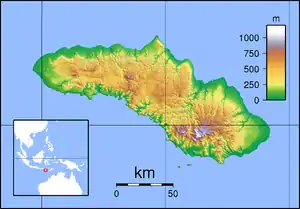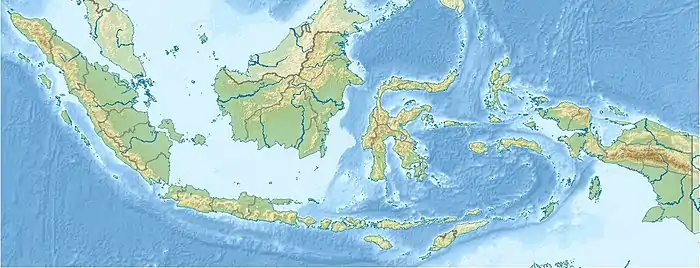| Polapare River Kali Polapari, Loko Polapari, Sungai Polapare, Loko Polapare, Lokoe Palaparé | |
|---|---|
 Location of the mouth  Polapare River (Indonesia) | |
| Location | |
| Country | Indonesia |
| Physical characteristics | |
| Source | |
| • location | Sumba |
| Mouth | Mananga Malandoh, Indian Ocean |
• location | Sumba Barat Daya Regency |
• elevation | 1 m (3 ft 3 in) |
| Length | 18 km (11 mi) |
The Polapare River (Indonesian: Kali Polapari) is a river of Sumba Barat Daya Regency in the island of Sumba, East Nusa Tenggara, Indonesia.[1][2] The length of the river is 18 km.[3] Offshore of the river mouth are the islands of Baholokmonegoro and Barenggemonokodi; Malondobara Island is 1¼ km to the west.[4]
Geography
The river flows along the southwestern area of Sumba with predominantly tropical monsoon climate (designated as Am in the Köppen–Geiger climate classification system).[5] The annual average temperature in the area is 24 °C. The warmest month is October, when the average temperature is around 28 °C, and the coldest is March, at 23 °C.[6] The average annual rainfall is 2377 mm The wettest month is January, with an average of 444 mm rainfall, and the driest is August, with 15 mm rainfall.[7]
Uses
The Polapare River is developed to be a microhydro energy source.[8]
See also
References
- ↑ Rand McNally, The New International Atlas, 1993.
- ↑ Loko Polapari at Geonames.org (cc-by); Last updated 17 January 2012; Database dump downloaded 27 November 2015
- ↑ Nama dan Panjang Sungai di Provinsi Nusa Tenggara Timur Menurut Kabupaten/Kota – BPS NTT. Sumber: Balai Wilayah Sungai NTT II. Diakses 28 Agustus 2017.
- ↑ Loko Porapari. Mapcarta.
- ↑ Peel, M C; Finlayson, B L; McMahon, T A (2007). "Updated world map of the Köppen-Geiger climate classification". Hydrology and Earth System Sciences. 11. doi:10.5194/hess-11-1633-2007.
- ↑ "NASA Earth Observations Data Set Index". NASA. 30 January 2016.
- ↑ "NASA Earth Observations: Rainfall (1 month – TRMM)". NASA/Tropical Rainfall Monitoring Mission. 30 January 2016.
- ↑ (in Indonesian) Hasil Diskusi Kelompok Fokus, Kelompok Kabupaten Sumba Barat Daya, MSF II NTT 14 – 15 Oktober 2014. A. Potensi Pengelolaan Sumber Daya Alam yang Berkelanjutan dan EBT.